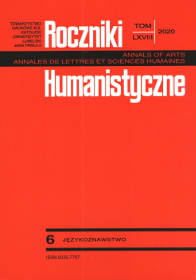Perswazja w czasach reformacji. Renesansowe teksty apologetyczne trzech konfesji: katolicyzmu, protestantyzmu i islamu
Persuasion at the Time of Reformation. Renaissance Apologetic Texts of Three Confessions: Catholicism, Protestantism and Islam
Author(s): Joanna Kamper-Warejko, Joanna Kulwicka-KamińskaSubject(s): Language and Literature Studies, Applied Linguistics, Stylistics
Published by: Towarzystwo Naukowe KUL & Katolicki Uniwersytet Lubelski Jana Pawła II
Keywords: sixteenth-century Polish language; Protestantism; religious language; sermon; linguistic means of persuasion
Summary/Abstract: The paper comprises a description of the religious language used in the Renaissance. It addresses the topic of the literature of Reformation and Counter-Reformation (Catholic Revival) periods and its significance as a uniting force for a given community of believers. Moreover, the paper describes the linguistic solutions and means of persuasion used to achieve that purpose. The study material are three sixteenth-century texts: two that originated in two Christian denominations – Catholic and Protestant ones (sermons published by Piotr Skarga and Petrus Artomius on the occasion of the Assumption Feast of Mary the Virgin in 1595) and one that derives from Islam (Surah 7 of the Quran “The Heights” translated by the Tatars of the Grand Duchy of Lithuania, 16th century). The analysis covers the structure of these historical texts, the exponents of dialogue and the linguistic means of persuasion which include, among others, evaluative and directive language as well as stylistic devices. Research has shown that the three religious polemical texts can be classified as persuasive literature of the Reformation. They comprise linguistic exponents with impressive and expressive functions. In the linguistic layer, the texts contain universal features of the religious code, such as openness and polysemy, which are expressed by analogy, comparison, metonymy, metaphor, and making non-assertive utterances. The paper discusses lexis excerpted from the texts and denoting values as well as volitive and imperative and persuasive and emotive vocabulary with noticeable dichotomic references to what is good and what is bad. These elements arrange the sacred space of the religious texts and constitute the axis of integration for a given community of believers. The result of religious discourse of the Reformation is the presence of the exponents of the rhetorical style in Polish texts, which is manifested by the use of quotations from authoritative religious works, i.e. mainly from the Bible and the Quran.
Journal: Roczniki Humanistyczne
- Issue Year: 68/2020
- Issue No: 6
- Page Range: 59-82
- Page Count: 24
- Language: Polish

